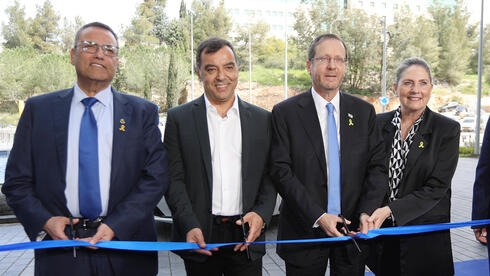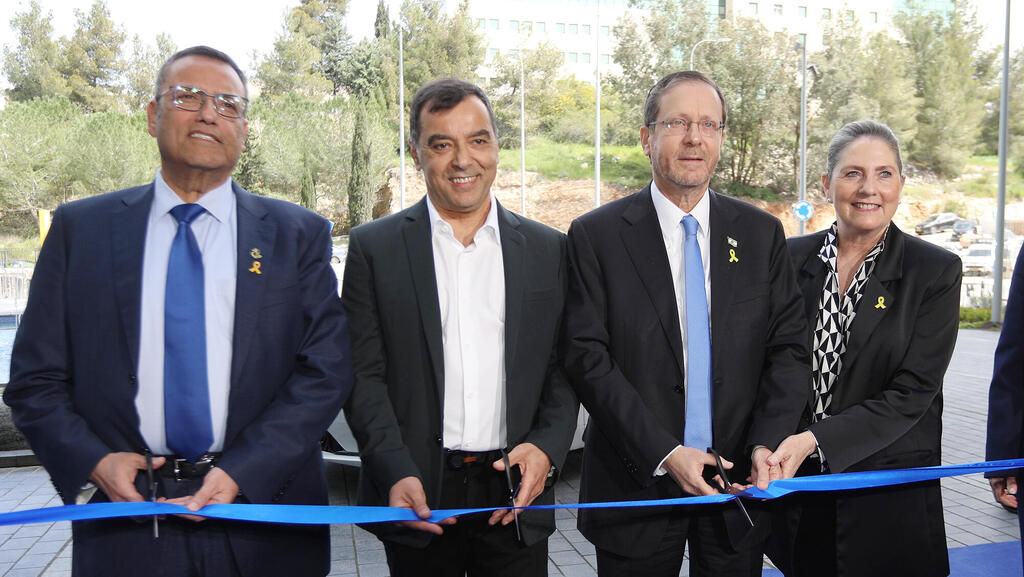
128,000 square meters, a hair salon and a basketball court: Mobileye opens new Jerusalem headquarters
2,700 Mobileye employees in Jerusalem are moving to the company's new campus, which in addition to the usual high-tech perks such as a gym, will also include a convenience store, running track, service points for leasing vehicles, and nursing rooms
After a huge investment of one billion shekels, 2,700 Mobileye employees in Jerusalem are starting to move to the company's new campus at the Har-Hotzavim Hi-Tech Park . The campus was inaugurated on Tuesday with the participation of Israel’s President Isaac Herzog and the Mayor of Jerusalem Moshe Lion, alongside the founder and CEO of Mobileye Amnon Shashua.
The company's employees, who until today were scattered in several locations in Jerusalem, will move to the new 128,000 square meter-campus, which will serve as Mobileye's headquarters. In addition, it has branches in Tel Aviv, Ramat Gan, Haifa and Petah Tikva, which employ about 600 workers and about 300 more employees outside of Israel. A week ago, Mobileye announced the closure of the long-standing aftermarket unit, and the dismissal of 130 employees, 90 of whom were based in Israel.
1 View gallery


Mobileye Jerusalem campus ribbon-cutting ceremony: (from left) Jerusalem Mayor Moshe Lion, Mobileye CEO Amnon Shashua, President and Mrs. Issac Herzog
(Photo: Sivan Farag)
Mobileye's new headquarters includes, in addition to the usual high-tech perks such as a gym, unusual additions including a hair salon, convenience store, basketball court, running track, service points for leasing vehicles, and nursing rooms. The operational side will be led by a digital management system that reports, among other things, a lack of equipment, an area that needs cleaning, alerts for problems in air conditioning systems, lighting, electricity, elevators, management of security events and the ability to learn from experience.
The new campus consists of four towers, four "fingers" connected by a common 8-story atrium. It is built according to the American Leed Platinum standard for green construction, which saves about 30% of energy consumption and about 40% of water consumption. Some of the challenges of the construction, which was also delayed quite a bit, stemmed from the obligation to use Jerusalem stone compared to the need for an innovative structure. In the end, a solution was found in the combination of external shading panels made of stone that were placed on the southern facade. These panels form a covering from the sun during the hot hours and result in a building with a transparent appearance.
The President remarked at the ribbon-cutting ceremony for the campus, "Amidst one of Israel's greatest challenges, perhaps its greatest since the establishment of the state itself, we witness a remarkable and characteristic occurrence. It is remarkable and surprising to behold this magnificent campus and the ongoing development fueled by the energy and technological talent that will benefit humanity at large. Conversely, it is characteristic because nothing exemplifies our people's ability to innovate, pioneer, and thrive amidst crisis better than this. The campus's contribution to Israel's economy, global standing, the high-tech industry, and future generations is paramount."
Amnon Shashua, President and CEO of Mobileye noted: "This is a defining moment in the life of Mobileye, which is also marking the 25th year since its founding. Mobileye was born in Jerusalem, and as you can see it will stay in Jerusalem. Mobileye has offices all over the country in Tel Aviv, Haifa, Petah Tikva, Ramat Gan and all over the world in Japan, China, Germany, France, the USA and soon also in India and Korea. But the center of gravity of the company is here and will remain here out of respect for our heritage and the desire to preserve the culture and the values that led us this far."













